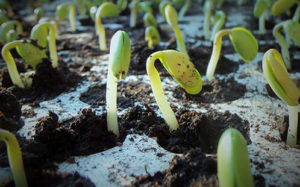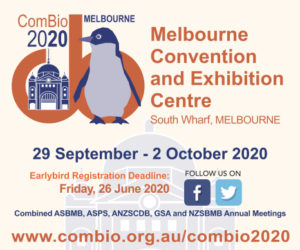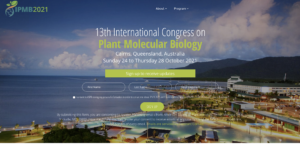- About
- Members
- Join
- Member log in
- Membership Renewal
- Member directory
- Life Members
- ASPS Life Member Professor Graham Farquhar
- ASPS Life Member Associate Professor Hendrik (Hank) Greenway
- ASPS Life Member Dr Marshall (Hal) D Hatch
- ASPS Life Member Dr Paul E Kriedmann
- ASPS Life Member Dr Mervyn Ludlow
- ASPS Life Member Emeritus Professor Rana Munns
- ASPS Life Member Conjoint Professor Christina E Offler
- ASPS Life Member Professor (Charles) Barry Osmond
- ASPS Life Member Emeritus Professor John W Patrick
- ASPS Life Member Dr Joe Wiskich
- Corresponding Members
- Elected Fellows
- Events
- Awards & Funding
- Employment
- Publications
- Research
- Teaching
- Menu
March Phytogen – Such hard times
24 March 2020
Welcome to Phytogen for March 2020. Unfortunately, this year will be remembered as the year our world tackled Covid-19. As we do this over the next few weeks and months, if it helps to alleviate uncertainty you can send me articles that inspire you (georgia.koerber@adelaide.edu.au) and to other members of our communications committee for sharing on Phytogen. Please include some commentary about why they inspire you and if they are in your research area. It would be awesome to receive some material where plants have contributed to solving global problems such as we are facing now, in the past or future.
To start, Chris Cazzonelli from the Hawkesbury Institute, Western Sydney University (WSU) has sent research by WSU and ANU. Click on the link or head to the website: https://phys.org/news/2020-03-darkness-unravel-energy.html. The research has discovered new chemical communication pathways that determine how plants change when they emerge from darkness in the soil to light with implications for their energy generation.
Something I have been amazed to read about is plants being used to create vaccines, as an alternative to chicken eggs; as bioreactors for growing vaccine proteins. The biopharmaceutical company from Canada, Medicago doesn’t work with a live virus, instead the team insert a genetic sequence into a soil bacteria, which is taken up by the plants, which then reportedly begin to produce the protein that can then be used as a vaccine. They soon hope to submit this unique technology for FDA approval. The difference between plants and eggs is “we go directly to producing the vaccine or the antibody without having to propagate the virus” Mr Bruce Clark said, CEO of Medicago.
This year, ASPS has had a new Honorary Secretary Simon Williams from ANU. Below he writes about his research.
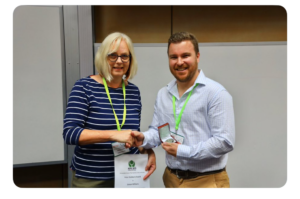
Simon Williams 2019 Peter Goldacre Recipient with ASPS President Kathy Soole at ASPS2019 LaTrobe University.
The structural-basis of plant innate immunity
It is estimated that plant diseases account for up to 15% of crop loses worldwide, presenting a significant economic, environmental and social challenge in a world facing increased demands on food, fibre and biofuels. While the lifestyles of plant pathogens are diverse, a common feature is the use of secreted proteins, collectively known as effectors, which promote pathogen virulence and facilitate disease. During infection plant pathogens can mobilise 10-100s of effector proteins. In response, plants utilise both extracellular and intracellular multi-domain immunity proteins to detect effectors and this recognition leads to disease resistance. The intracellular immunity receptors, known as nucleotide-binding oligomerisation domain-like receptors (NLRs), are arguably the most important plant immunity receptor and can recognise specific effectors to provide protection against potential pathogens. Plant genomes contain hundreds, in some cases thousands, of NLR genes, to ensure maximum protection within their environment. Despite this, resistance is defeated when this repertoire of NLRs can no longer perceive the presence of an effector during the plant-pathogen interaction. We are interested in understanding how NLR proteins perceive effectors and activate disease resistance pathways. To study this, we use a multidisciplinary approach harnessing the power of protein structural biology, biochemistry and biophysics to inform our studies in plants. The Peter Goldacre award recognises the contributions that I have made to understanding how NLR proteins signal via protein-protein oligomerisation through their N-terminal (see papers below). Of course, these achievements were the result of a large team effort and involved numerous national and international collaborators.
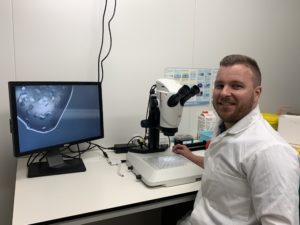
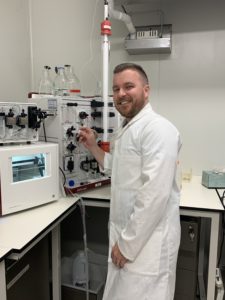
Recently, I started my own laboratory in the Division of Plant Sciences within the Research School of Biology at the Australian National University.
Simon in the lab working with plant proteins.
Our Structural Plant Immunology laboratory seek to understand the molecular-basis of fungal pathogenicity and plant innate immunity. A major focus of our work is the development of methodologies that will enable the engineering of synthetic plant immunity receptors. If successful, we believe these tools and techniques could revolutionise the number of NLR genes available to plant breeders to reduce losses induced by pathogens in instances where resistance does not exist or has been overcome.
I’m excited to take on the role of honorary secretary for ASPS. I joined ASPS at the start of my PhD and have benefited significantly through the collegiality and support that the society provides. I look forward to supporting and promoting the society in my new role.
Williams SJ, Sohn KH, Wan L, Bernoux M, Sarris PF, Segonzac C, Ve T, Ma Y, Saucet SB, Ericsson DJ, Casey LW, Lonhienne T, Winzor DJ, Zhang X, Coerdt A, Parker JE, Dodds PN, Kobe B, Jones JDG (2014). Structural basis for assembly and function of a heterodimeric plant immune receptor. Science, 344: 299-303.
Casey L, Lavrencic P, Bentham AR, Cesari S, Ericsson DJ, Croll T, Turk D, Anderson PA, Mark AE, Dodds PN, Mobli M, Kobe B, Williams SJ (2016). The CC domain structure from the wheat stem rust resistance protein Sr33 challenges paradigms for dimerization in plant NLR proteins. PNAS. 113 (45), 12856-12861.
Zhang X, Bernoux M, Bentham AR†, Newman TE, Ve T, Casey LW, Raaymakers TM, Hu J, Croll TI, Schreiber KJ, Staskawicz BJ, Anderson PA, Sohn KH, Williams SJ, Dodds PN and Kobe B. (2017) Multiple functional self-association interfaces in plant TIR domains. PNAS. 114: E2046-E2052.
Keep these meetings in your calendar: ComBio2020 and IPMB2021
 Keep sending your images to Tam Salter for our ASPS banners.
Keep sending your images to Tam Salter for our ASPS banners.
Please ensure they are .PNG , .jpg, .TIFF, or .pdf, with greater than 300 dpi, email: william.salter@sydney.edu.au
If the images have people, they will have to sign a permission form: ASPSbanner2020
Please print the permission form and have them sign then send along with your image to Tam, we look forward to receiving your images.
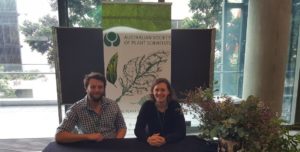
Recent Posts
Tags
Archives
- June 2025
- May 2025
- April 2025
- March 2025
- February 2025
- January 2025
- December 2024
- November 2024
- October 2024
- September 2024
- August 2024
- July 2024
- June 2024
- May 2024
- April 2024
- February 2024
- January 2024
- November 2023
- October 2023
- September 2023
- August 2023
- July 2023
- June 2023
- May 2023
- April 2023
- March 2023
- February 2023
- December 2022
- November 2022
- October 2022
- September 2022
- August 2022
- July 2022
- June 2022
- May 2022
- April 2022
- March 2022
- February 2022
- January 2022
- December 2021
- November 2021
- October 2021
- September 2021
- August 2021
- July 2021
- June 2021
- April 2021
- March 2021
- February 2021
- January 2021
- December 2020
- November 2020
- October 2020
- September 2020
- August 2020
- July 2020
- June 2020
- May 2020
- April 2020
- March 2020
- February 2020
- January 2020
- December 2019
- November 2019
- October 2019
- September 2019
- August 2019
- July 2019
- June 2019
- May 2019
- April 2019
- March 2019
- February 2019
- January 2019
- December 2018
- November 2018
- October 2018
- September 2018
- August 2018
- July 2018
- June 2018
- May 2018
- April 2018
- March 2018
- February 2018
- January 2018
- December 2017
- November 2017
- October 2017
- September 2017
- August 2017
- July 2017
- June 2017
- May 2017
- April 2017
- March 2017
- February 2017
- January 2017
- December 2016
- November 2016
- October 2016
- September 2016
- August 2016
- July 2016
- June 2016
- May 2016
- April 2016
- March 2016
- February 2016
- January 2016
- December 2015
- November 2015
- October 2015
- September 2015
- August 2015
- July 2015
- June 2015
- May 2015
- April 2015
- March 2015
- February 2015
- January 2015
- December 2014
- November 2014
- October 2014
- September 2014
- August 2014
- July 2014
- June 2014
Copyright 2017 Australian Society of Plant Scientists Disclaimer & Privacy
Website by Michael Major Media

